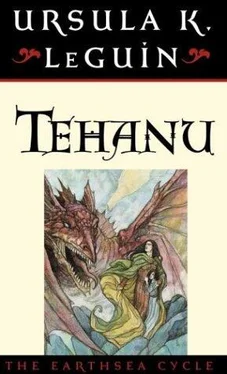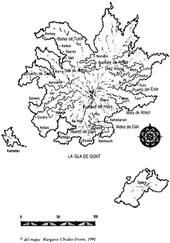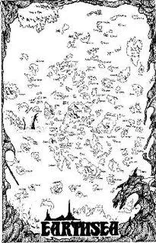Ursula Le Guin - Tehanu The Last Book of Earthsea
Здесь есть возможность читать онлайн «Ursula Le Guin - Tehanu The Last Book of Earthsea» весь текст электронной книги совершенно бесплатно (целиком полную версию без сокращений). В некоторых случаях можно слушать аудио, скачать через торрент в формате fb2 и присутствует краткое содержание. Город: New York, Год выпуска: 1990, Издательство: Atheneum, Жанр: Фэнтези, на английском языке. Описание произведения, (предисловие) а так же отзывы посетителей доступны на портале библиотеки ЛибКат.
- Название:Tehanu The Last Book of Earthsea
- Автор:
- Издательство:Atheneum
- Жанр:
- Год:1990
- Город:New York
- ISBN:нет данных
- Рейтинг книги:4 / 5. Голосов: 1
-
Избранное:Добавить в избранное
- Отзывы:
-
Ваша оценка:
- 80
- 1
- 2
- 3
- 4
- 5
Tehanu The Last Book of Earthsea: краткое содержание, описание и аннотация
Предлагаем к чтению аннотацию, описание, краткое содержание или предисловие (зависит от того, что написал сам автор книги «Tehanu The Last Book of Earthsea»). Если вы не нашли необходимую информацию о книге — напишите в комментариях, мы постараемся отыскать её.
Tehanu The Last Book of Earthsea — читать онлайн бесплатно полную книгу (весь текст) целиком
Ниже представлен текст книги, разбитый по страницам. Система сохранения места последней прочитанной страницы, позволяет с удобством читать онлайн бесплатно книгу «Tehanu The Last Book of Earthsea», без необходимости каждый раз заново искать на чём Вы остановились. Поставьте закладку, и сможете в любой момент перейти на страницу, на которой закончили чтение.
Интервал:
Закладка:
They sat a long while silent in the darkness.
“When you had a man, Moss, did you have to give up your power?”
“Not a bit of it,” the witch said, complacent.
“But you said you don’t get unless you give. Is it different, then, for men and for women?”
“What isn’t, dearie?”
“I don’t know,” Tenar said. “It seems to me we make up most of the differences, and then complain about ‘em. I don’t see why the Art Magic, why power, should be different for a man witch and a woman witch. Unless the power itself is different. Or the art.”
“A man gives out, dearie. A woman takes in.”
Tenar sat silent but unsatisfied.
“Ours is only a little power, seems like, next to theirs,” Moss said. “But it goes down deep. It’s all roots. It’s like an old blackberry thicket. And a wizard’s power’s like a fir tree, maybe, great and tall and grand, but it’ll blow right down in a storm. Nothing kills a blackberry bramble.” She gave her hen-chuckle, pleased with her comparison. “Well, then!” she said briskly. “So as I said, it’s maybe just as well he’s on his way and out o’ the way, lest people in the town begin to talk.” “To talk?”
“You’re a respectable woman, dearie, and her reputation is a woman’s wealth.”
“Her wealth,” Tenar repeated in the same blank way; then she said it again: “Her wealth. Her treasure. Her hoard. Her value She stood up, unable to sit still, stretching her back and arms. “Like the dragons who found caves, who built fortresses for their treasure, for their hoard, to be safe, to sleep on their treasure, to be their treasure. Take in, take in, and never give out!”
“You’ll know the value of a good reputation,” Moss said drily, “when you’ve lost it. ‘Tisn’t everything. But it’s hard to fill the place of.”
“Would you give up being a witch to be respectable, Moss?”
“I don’t know,” Moss said after a while, thoughtfully. “I
don’t know as I’d know how. I have the one gift, maybe, but not the other.”
Tenar went to her and took her hands. Surprised at the gesture, Moss got up, drawing away a little; but Tenar drew her forward and kissed her cheek.
The older woman put up one hand and timidly touched Tenar’s hair, one caress, as Ogion had used to do. Then she pulled away and muttered about having to go home, and started to leave, and asked at the door, “Or would you rather I stayed, with them foreigners about?”
“Go on,” Tenar said. “I’m used to foreigners.”
That night as she lay going to sleep she entered again into the vast gulfs of wind and light, but the light was smoky, red and orange-red and amber, as if the air itself were fire. In this element she was and was not; flying on the wind and being the wind, the blowing of the wind, the force that went free; and no voice called to her.
In the morning she sat on the doorstep brushing out her hair. She was not fair to blondness, like many Kargish people; her skin was pale, but her hair dark. It was still dark, hardly a thread of grey in it. She had washed it, using some of the water that was heating to wash clothes in, for she had decided the laundry would be her day’s work, Ged being gone, and her respectability secure. She dried her hair in the sun, brushing it, In the hot, windy morning, sparks followed the brush and crackled from the flying ends of her hair.
Therru came to stand behind her, watching. Tenar turned and saw her so intent she was almost trembling.
“What is it, birdlet?”
“The fire flying out,” the child said, with fear or exultation. “All over the sky!”
“It’s just the sparks from my hair,” Tenar said, a little taken aback. Therru was smiling, and she did not know if she had ever seen the child smile before. Therru reached out both her hands, the whole one and the burned, as if to touch and follow the flight of something around Tenar’s loose, floating hair. “The fires, all flying out,” she repeated, and she laughed.
At that moment Tenar first asked herself how Therru saw her-saw the world-and knew she did not know: that she could not know what one saw with an eye that had been burned away. And Ogion’s words, They wi/I fear her, returned to her; but she felt no fear of the child. Instead, she brushed her hair again, vigorously, so the sparks would fly, and once again she heard the little husky laugh of delight.
She washed the sheets, the dishcloths, her shifts and spare dress, and Therm’s dresses, and laid them out (after making sure the goats were in the fenced pasture) in the meadow to dry on the dry grass, weighting down the things with stones, for the wind was gusty, with a late-summer wildness in it.
Therm had been growing. She was still very small and thin for her age, which must be about eight, but in the last couple of months, with her injuries healed at last and free of pain, she had begun to run about more and to eat more. She was fast outgrowing her clothes, hand-me-downs from Lark’s youngest, a girl of five.
Tenar thought she might walk into the village and visit with Weaver Fan and see if he might have an end or two of cloth to give in exchange for the swill she had been sending for his pigs. She would like to sew something for Therru. And she would like to visit with old Fan, too. Ogion’s death and Ged’s illness had kept her from the village and the people she had known there. They had pulled her away, as ever, from what she knew, what she knew how to do, the world she had chosen to live in-a world not of kings and queens, great powers and dominions, high arts and journeys and adventures (she thought as she made sure Therru was with Heather, and set off into town), but of common people doing common things, such as marrying, and bringing up children, and farming, and sewing, and doing the wash. She thought this with a kind of vengefulness, as if she were thinking it at Ged, now no doubt halfway to Middle Valley. She imagined him on the road, near the dell where she and Therru had slept. She imagined the slight, ashen-haired man going along alone and silently, with half a loaf of the witch’s bread in his pocket, and a load of misery in his heart.
“It’s time you found out, maybe,” she thought to him. “Time you learned that you didn’t learn everything on Roke!” As she harangued him thus in her mind, another image came into it: she saw near Ged one of the men who had stood waiting for her and Therru on that road. Involuntarily she said, “Ged, be careful!”-fearing for him, for he did not carry even a stick. It was not the big fellow with hairy lips that she saw, but another of them, a youngish man with a leather cap, the one who had stared hard at Therru.
She looked up to see the little cottage next to Fan’s house, where she had lived when she lived here. Between it and her a man was passing. It was the man she had been remembering, imagining, the man with a leather cap. He was going past the cottage, past the weaver’s house; he had not seen her. She watched him walk on up the village street without stopping. He was going either to the turning of the hill road or to the mansion house.
Without pausing to think why, Tenar followed him at a distance until she saw which turn he took. He went on up the hill to the domain of the Lord of Re Albi, not down the road that Ged had gone.
She turned back then, and made her visit to old Fan.
Though almost a recluse, like many weavers, Fan had been kind in his shy way to the Kargish girl, and vigilant. How many people, she thought, had protected her respectability! Now nearly blind, Fan had an apprentice who did most of the weaving. He was glad to have a visitor. He sat as if in state in an old carved chair under the object from which his use-name came: a very large painted fan, the treasure of his family-the gift, so the story went, of a generous sea-pirate to his grandfather for some speedy sail-making in time of need. It was displayed open on the wall. The delicately painted men and women in their gorgeous robes of rose and jade and azure, the towers and bridges and banners of Havnor Great Port, were all familiar to Tenar as soon as she saw the fan again. Visitors to Re Albi were often brought to see it. It was the finest thing, all agreed, in the village.
Читать дальшеИнтервал:
Закладка:
Похожие книги на «Tehanu The Last Book of Earthsea»
Представляем Вашему вниманию похожие книги на «Tehanu The Last Book of Earthsea» списком для выбора. Мы отобрали схожую по названию и смыслу литературу в надежде предоставить читателям больше вариантов отыскать новые, интересные, ещё непрочитанные произведения.
Обсуждение, отзывы о книге «Tehanu The Last Book of Earthsea» и просто собственные мнения читателей. Оставьте ваши комментарии, напишите, что Вы думаете о произведении, его смысле или главных героях. Укажите что конкретно понравилось, а что нет, и почему Вы так считаете.








